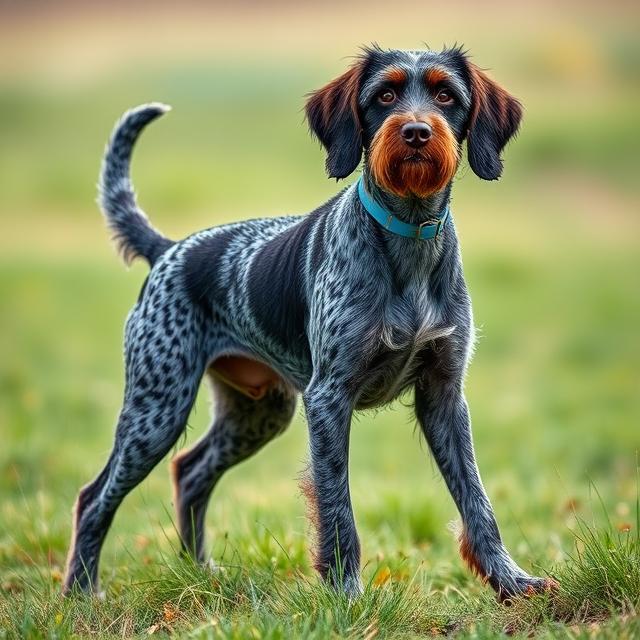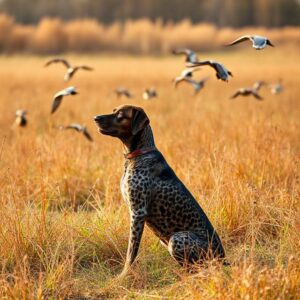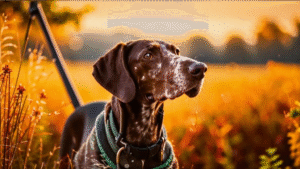Why German Wirehaired Pointers Dominate Colorado’s Rugged Hunting Terrain
Colorado’s diverse and challenging landscapes demand a hunting dog that’s tough, adaptable, and resilient. The German Wirehaired Pointer (GWP) stands out as the ultimate companion for hunters tackling the Rocky Mountains, high-altitude chukar hunts, and dense terrain. With their intelligence, endurance, and weather-resistant coat, GWPs thrive where other breeds struggle.
The Perfect Match – German Wirehaired Pointers and Colorado’s Wilderness
Colorado’s wild landscapes—steep mountains, dense forests, and high-altitude plains—demand a hunting dog that can keep up. Enter the German Wirehaired Pointer (GWP), a rugged, all-terrain hunting companion built for the state’s toughest conditions. Whether you’re chasing birds in the Rockies or trekking through rough backcountry, these dogs prove time and again why they’re among the best hunting dogs for Rocky Mountains terrain. Their toughness, intelligence, and adaptability make them a favorite among Colorado hunters. So, what is it about the German Wirehaired Pointer Colorado hunters trust so much? Let’s break it down.
Built for the Rockies – Why GWPs Excel
You want a dog that can handle Colorado’s wild mood swings and brutal terrain? Look no further than the German wirehaired pointer. This ain’t some pampered house pet – it’s a rugged, all-weather hunting companion bred specifically for the kind of challenges the Rockies throw at you.
That signature scruffy coat isn’t just for show. That wiry fur acts like nature’s best armor against Colorado’s harsh elements. Icy winds cutting across alpine meadows? No problem. Dense thickets of thorny brush in the foothills? Barely notices. Late spring snowstorm catches you off guard? Just another day at the office for a GWP. That’s why serious Colorado pointer breeders put such emphasis on maintaining those protective coat qualities.
When it comes to endurance, these dogs are absolute beasts. While you’re gasping for air at 11,000 feet, your GWP is just hitting its stride. They’ve got lungs and legs built for marathon days in the backcountry, whether you’re chasing chukars up shale-covered slopes or working marsh edges for ducks. That relentless energy comes from generations of breeding dogs that could work all day in Europe’s toughest conditions – and they’ve adapted perfectly to Colorado’s high country.
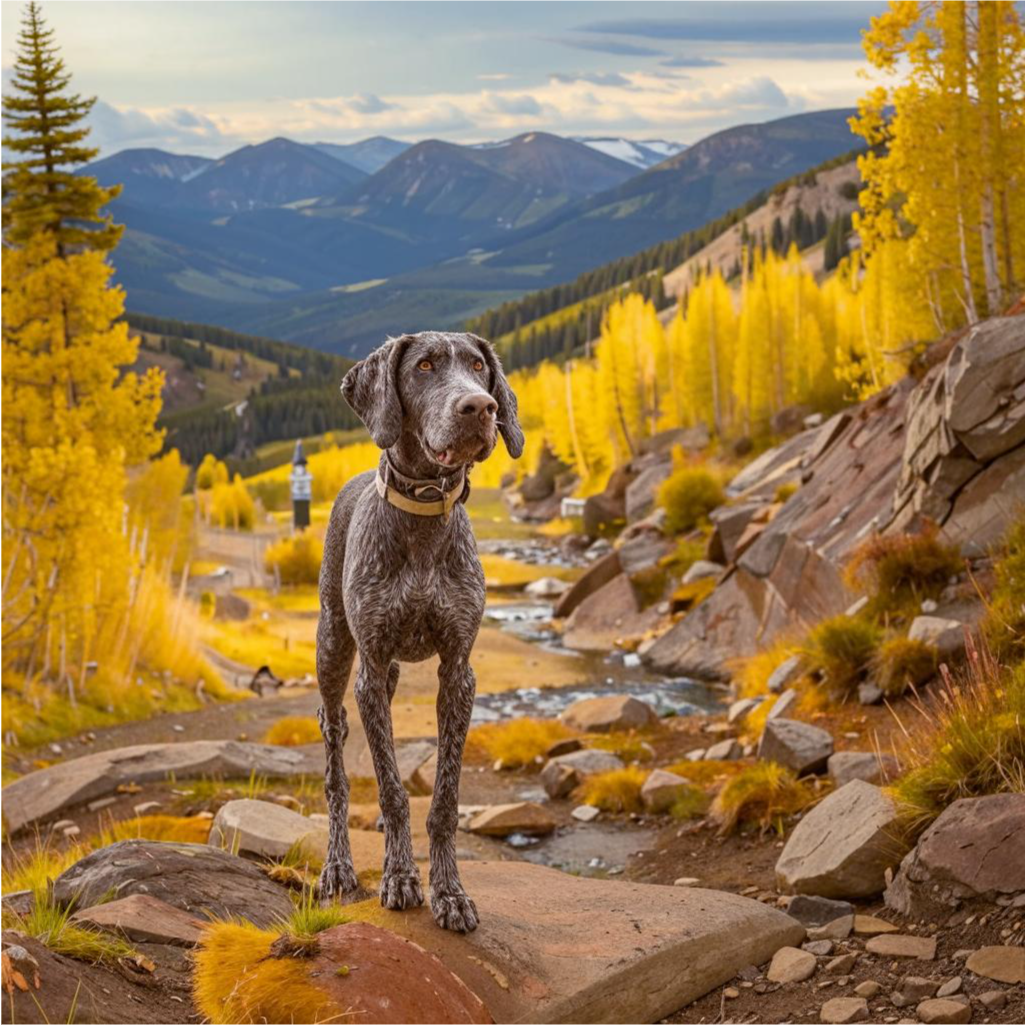
What really sets the German wirehaired pointer apart is its Swiss Army knife skill set. Need a solid pointer for those high-altitude blue grouse? Check. Want a reliable retriever for those late-season mallards in half-frozen ponds? Done. Tracking wounded game through dense timber? They’ve got you covered. This versatility makes them the perfect partner for Colorado hunters who chase multiple species across varied terrain.
While other breeds might specialize in one area, the GWP does it all without breaking stride. Sure, a Lab might outperform in water retrieves, and a Vizsla might look prettier on point, but neither can match the German wirehaired pointer’s complete package for Colorado conditions. When you’re dealing with the state’s unpredictable weather, extreme elevation changes, and diverse game species, you need a dog that can handle anything – and that’s exactly what you get with a well-bred GWP.
That’s why knowledgeable Colorado hunters keep coming back to this breed season after season. When the going gets tough in the high country, you’ll be glad you’ve got a German wirehaired pointer by your side – there’s simply no better all-around hunting dog for the Rocky Mountain west.
Best Hunting Dogs for Rocky Mountains – How GWPs Compare
When it comes to hunting the Rocky Mountains, not all dogs are created equal. Let’s break down why the German wirehaired pointer Colorado hunters swear by beats out the competition.
First up, Labs. Yeah, they’re the classic water dogs – nobody retrieves a duck better. But take them into Colorado’s high country and you’ll see the limitations. That short, dense coat that works great in water turns into a liability when you’re pushing through prickly pear or facing sudden snow squalls. A GWP’s weatherproof jacket laughs at that stuff while your Lab’s shivering and picking thorns out of its paws.
Then there’s Vizslas. Beautiful dogs, no doubt, and they can cover ground like nobody’s business. But that sleek coat that looks so pretty in the show ring turns into a real problem when you’re hunting late season in the Rockies. While your Vizsla’s turning into a popsicle at first light, a German wirehaired pointer’s already working the field like it’s a summer day.
Brittanys get honorable mention – they’ve got energy for days and solid bird instincts. But when you’re chasing chukars up those brutal shale slides or busting through ice-crusted cattails for pheasants, they just don’t have the same brute strength and durability. A GWP will power through conditions that would leave a Brittany limping back to the truck.
What makes German wirehaired pointers the best hunting dogs for Rocky Mountains comes down to their complete package. That rugged coat handles everything from desert heat to alpine snow. Their build gives them the stamina for marathon days at elevation. And their brains make them adaptable to whatever game you’re after – from high-country grouse to waterfowl in frozen marshes.
At the end of the day, you can specialize with other breeds, but if you want one dog that does it all in Colorado’s toughest conditions, the German wirehaired pointer stands alone. They’re not just good hunting dogs – they’re mountain-tough, all-terrain hunting machines built specifically for the challenges Rocky Mountain hunters face every season’s.
Real-World Performance – Stories from Colorado Hunters
Talk to any seasoned Colorado hunter with a GWP, and they’ll tell you—the proof is in the field.
“Last season, my GWP tracked a wounded bird through a snowstorm near Leadville. Most dogs would’ve quit, but she pushed through and found it.” – Mark, avid chukar hunter.
“Last season, my GWP tracked a wounded bird through a snowstorm near Leadville. Most dogs would’ve quit, but she pushed through and found it.”
Mark, avid chukar hunter.
and
“I’ve had Labs before, but my GWP handles the high country better. He doesn’t get as tired, and his coat protects him from the brush.”
– Sarah, upland bird enthusiast.
These aren’t just fluke stories—GWPs are consistently reliable in Colorado’s toughest conditions. Whether it’s scaling rocky slopes or busting through thick cover, they’re built to perform.
If you’re hunting in Colorado, you need a dog that can handle whatever the mountains throw at them. The German Wirehaired Pointer isn’t just another bird dog—it’s a high-performance hunting partner designed for rugged terrain. From their weatherproof coat to their tireless stamina, it’s no wonder they’re considered one of the best hunting dogs for Rocky Mountains adventures.
Finding the Right GWP – Colorado Pointer Breeders to Trust
When you’re looking for a German Wirehaired Pointer in Colorado, you don’t just want any dog—you want a hunting partner that’s built to handle the rugged terrain and unpredictable weather of the Rockies. That starts with finding the right breeder who knows what they’re doing.
First things first—health is everything. A good Colorado GWP breeder will have all the necessary health clearances, including hip and elbow evaluations, eye certifications, and genetic testing for common breed-specific conditions. You want a dog that’s not just tough but built to last, especially if you’re planning on putting in long days chasing chukar across steep, rocky slopes. There’s nothing worse than a hunting dog breaking down in the field because of avoidable genetic issues.
Next, you’ll want to look at bloodlines. A reputable breeder won’t just show you papers—they’ll be able to tell you exactly how their dogs perform in the field. If you’re serious about GWP for chukar hunting, you need a breeder who prioritizes working ability over just looks or show titles. Ask about the parents’ hunting experience, stamina, and prey drive. The best breeders will have dogs that are proven in real hunting scenarios, not just training grounds.
Reputation matters, too. Talk to other hunters, check online reviews, and don’t be afraid to ask for references. A trustworthy breeder will have a history of happy clients with dogs that actually perform in Colorado’s tough conditions. If a breeder hesitates to connect you with past buyers, that’s a red flag.
Now, if you’re looking for top-notch German Wirehaired Pointer breeders in Colorado, there are a few names that consistently come up among serious hunters. Mountain Peak GWPs, for example, specializes in high-drive dogs that thrive in the backcountry—exactly what you need for those grueling chukar hunts. Then there’s Rocky Mountain Wirehairs, known for producing dogs with strong chukar-hunting lineages. These breeders don’t just sell puppies; they match you with a dog that fits your hunting style.
Bottom line? If you want a German Wirehaired Pointer in Colorado that can keep up with the demands of chukar hunting, do your homework. Find a breeder who prioritizes health, proven hunting ability, and a solid reputation. It might take a little extra effort, but when you’re standing on a steep hillside watching your GWP lock up on a covey of chukar, you’ll know it was worth it.
GWP for Chukar Hunting – A High-Altitude Specialist
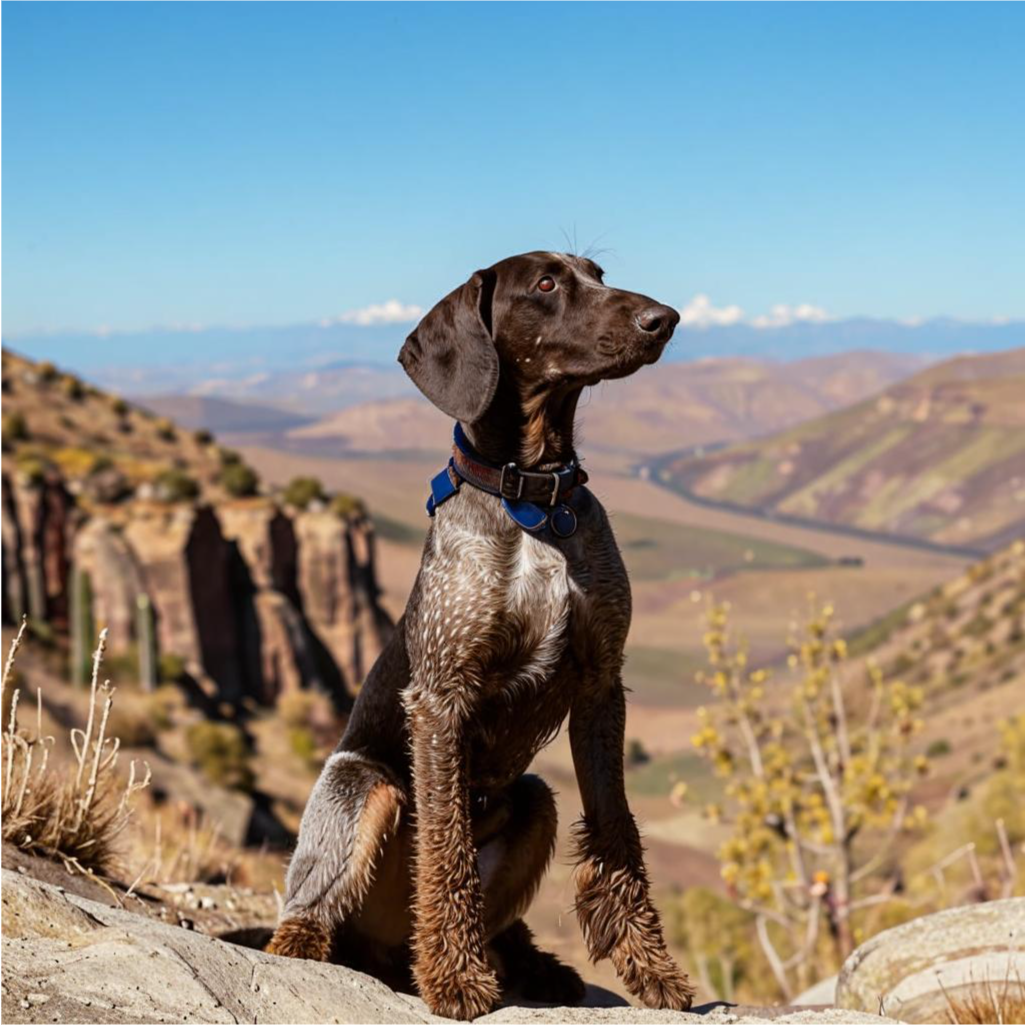
If you’re chasing chukar in Colorado’s high country, you need a dog built for the job. Enter the German Wirehaired Pointer – a four-legged mountain athlete with the stamina, brains, and toughness to handle our most challenging terrain. Here’s why GWPs dominate where other dogs struggle, and how to train them for high-altitude success.
- Born to Climb
Chukars don’t play fair – they hole up in the steepest, rockiest hellscapes Colorado can offer. Good news: your GWP eats that terrain for breakfast. These dogs are natural mountaineers with muscular hindquarters that propel them up slopes like they’ve got built-in crampons. Their rough, durable paws handle sharp rocks and cactus without flinching, while that wiry coat protects against brush and cold winds. - High-Altitude Nose Work
Thin mountain air kills scenting ability in most breeds – but not GWPs. Their German-engineered noses somehow work better when the oxygen gets scarce. They’ll lock onto chukar scent that would leave other dogs confused, then methodically work uphill to pin the covey. It’s like they’ve got some secret algorithm for processing high-country scent conditions. - Training for the Thin Air
High altitude dog training starts young with these pups. Smart owners:
- Gradually acclimate puppies starting at 6-8 months
- Mix short high-country hikes with play sessions
- Always watch for signs of altitude stress
The key is making elevation gains slowly – don’t shock their system. By hunting season, your GWP should be cruising at 10,000 feet like it’s nothing.
- Building Mountain Endurance
Chukar hunting isn’t for the weak. Condition your GWP with:
- Daily uphill runs (start easy, increase steepness)
- Weighted vest walks (only after 18 months old)
- Rough terrain paw toughening exercises
- Cooling vest training for those surprise warm days
- Steadiness is Everything
That intense GWP prey drive needs focus. Drill:
- Rock-solid “whoa” commands
- Patient approaches on pointed birds
- Calm retrieves in steep terrain
Reward discipline heavily – a broke dog is worth ten flashy but uncontrolled workers in chukar country.
When trained right, your German Wirehaired Pointer becomes more than a hunting dog – it transforms into a high-altitude specialist that lives for Colorado’s toughest chukar grounds. They’ll outwork you, outclimb you, and constantly remind you why they’re the best investment a mountain hunter can make.
High-Altitude Dog Training – Preparing Your GWP for the Mountains
When it comes to hunting Colorado’s rugged backcountry, German Wirehaired Pointers stand in a league of their own. These versatile hunting dogs possess the perfect blend of endurance, intelligence, and toughness needed to conquer the Rocky Mountains. But even the best hunting dogs for Rocky Mountains need proper preparation to perform at their peak in high-altitude conditions. Here’s how to get your GWP ready for those demanding alpine adventures.
Acclimating Your Dog to Elevation
Altitude affects dogs just like it affects humans, and that tough German Wirehaired Pointer Colorado hunters rely on needs time to adjust. Start with short trips to moderate elevations around 7,000-8,000 feet before gradually working up to higher terrain. Keep training sessions brief at first, watching for signs of altitude stress like excessive panting or lethargy. Hydration becomes absolutely critical in Colorado’s dry mountain air – always carry extra water and take frequent breaks. Nutrition matters too. Increase food portions slightly to account for the extra energy burned at elevation, and consider adding supplements like fish oil to support joint health during those long, steep climbs.
Conditioning for Rugged Terrain
Colorado doesn’t do easy terrain, and neither should your training regimen. Hill sprints should become a regular part of your GWP’s routine, building explosive power in those muscular hindquarters for sudden chukar pursuits. Once your dog reaches about two years old, introduce a lightweight pack to simulate carrying birds during extended hunts – start with just a pound or two and gradually increase weight. Paw care deserves special attention in the Rockies. Alternate training between rocky trails and snowy conditions to naturally toughen pads, and always carry paw wax for when the terrain gets particularly harsh. Many experienced hunters swear by post-hike paw massages with coconut oil to prevent cracking in Colorado’s arid climate.
The secret to success with these best hunting dogs for Rocky Mountains lies in consistent, thoughtful preparation. Your German Wirehaired Pointer Colorado adventure begins long before opening day with gradual conditioning hikes that increase in distance and difficulty. Expose your dog to varied weather conditions too – blazing sun at 10,000 feet one day, freezing rain the next. The more diverse conditions they experience in training, the better they’ll perform when it counts. When you finally see your GWP effortlessly navigating terrain that leaves other dogs – and hunters – struggling, you’ll understand why serious mountain hunters consider these dogs irreplaceable partners in Colorado’s high country.
Conclusion
When it comes to conquering Colorado’s rugged backcountry, few dogs match the German Wirehaired Pointer’s toughness and versatility. Whether you’re chasing chukars in steep canyons or navigating dense forests, a well-bred GWP from trusted Colorado pointer breeders will be your best hunting partner. With proper high-altitude dog training, these dogs prove why they’re the best hunting dogs for Rocky Mountains adventures.
